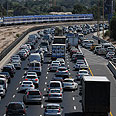
Illustration
Photo: Yaron Brener
Only 30% of Israelis use public transit – one of the lowest rates in the world, a new study commissioned by the Transportation Ministry shows.
According to the data, Israel's roads are more congested than most countries in the Organization for Economic Co-operation and Development (OECD).
Environment
Billie Frenkel
Green groups fed up with gov't municipalities flouting of Clean Air Law; label Tel Aviv, Jerusalem and Haifa as 'air pollution-stricken'
Researchers claim that if more residents choose to use the country's buses and trains, Israel could save up to NIS 400 million ($100 million) a year. They urge municipalities to establish independent transportation authorities as part of an intensive effort to encourage Israelis to use public transit.
Among 29 cities whose populations are larger than 3 million – similarly to the Tel Aviv metropolitan area – 28 have their own transportation authorities.
Residents of large European cities are much more inclined towards using means of public transportation than those in Tel Aviv, where only 30% of the population use buses and trains. In Warsaw, 70% use public transport, while in Barcelona and Zurich 65% and 63% do the same, respectively.
"Developing the public transportation industry harbors great economic potential," said Omer Teper, vice president of the Shaldor strategic consulting firm, which conducted the study.
According to Teper, while a car ride costs NIS 38 ($9.5), a public transit ride costs only NIS 14 ($3.5) on average. And yet, Israelis largely choose to use cars. He noted that people tend to become more dependent on cars once they move to the suburbs, but stressed that this trend increases road congestion and widens social class gaps.
"Getting only 1% of private car users in the Tel Aviv metro area to use public transportation would contribute about NIS 270 million (NIS 67.5 million) to the economy each year," he said.















